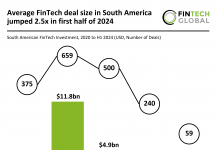bunq’s founder is considering a US expansion and hints at making the challenger bank’s first funding round ever. But first, Ali Niknam must overcome Brexit and the coronavirus.
Ali Niknam has always loved technology. At the age of nine, his parents gave him his first computer and he became hooked from the get-go. “Once I started to understand what coding really meant, well, it was just a magical experience because when you’re coding there really is no limit other than what is in your mind,” he tells FinTech Global. “Creating things is just amazing. I was completely consumed by it.”
While his parents occasionally had to plead with him to spend time outside, those hours in front of the screen laid the foundation for his future entrepreneurial endeavours. The passion drove him through his studies in computer science at the Delft University of Technology and saw him launch the web-hosting startup TransIP in 2003 when he was only 21 years old. The same excitement has also fuelled his latest venture – bunq, the Dutch neobank that is challenging traditional lenders and giving rivals like Revolut and N26 a run for their money.

Since the launch in 2012, bunq has gone live across 30 different European markets, has processed over €433m in user deposits and has done so without a cent of venture capital funding, something almost none of its competitors have managed. He bootstrapped the launch of the company through the money he had from TransIP.
Although, Niknam hints that venture capital funding might be in bunq’s future. But first, before anything else, bunq must deal with the fallout of the coronavirus and decide whether or not Brexit will spell the end of the FinTech scaleup’s presence in the UK.
The origins of bunq dates back to when Niknam had just stepped down from actively running TransIP in order to, as he put it, ensure that the company could achieve its potential. However, the move meant Niknam was left with a lot of money and time on his hands. “I started thinking about what to do next [because] it felt [like] I was a little bit too young to, you know, buy a boat and live on the beach,” he quips.
The 2008 recession provided the answer. The credit crunch forced several of his friends to shut down their startups or to lose their mortgages. “Other friends of mine worked at banks and, through no fault of their own, were now suddenly demonised,” Niknam says, identifying the banking industry as the core problem to the situation.
Over the years the industry had become an unchangeable unified monolith that he believed someone needed to shake out of its lethargy. And as he didn’t see anyone else step up to bat, he took it upon himself to transform the world of banking. “We decided to create a bank that was different from all the others [in order] to create diversity in a very uniform sector, to bring choice, to bring colour, to just bring a different experience, thereby making the sector more resilient,” he says.
However, he quickly realised that running a digital bank was very different from spearheading an IT company. At the surface, both bunq and TransIP are tech companies striving to “empower our users and enable them to do whatever they want whenever they want with whomever they want.” But the similarities end there. “I went from a completely unregulated sector to a heavily over-regulated sector,” Niknam says. Ensuring bunq complied with both Dutch and international regulations was the “most complex part of [running] a bank.”
For example, getting a banking licence from the Dutch Central Bank (DNB) proved a huge undertaking. “The Dutch authority is very, very strict, maybe even one of the strictest in the world and [there hadn’t been a new issued] banking license for 35 years,” he says, adding that those three decades have added more regulations and restrictions. Moreover, he claims that there was no one left at the banking regulator that actually knew how to issue a licence, meaning the startup and the authority had to figure it out together. “So it was really, really tough,” he says. Eventually, DNB granted bunq a banking licence in September 2014 and launched to the public in November 2015.
With the first public version up and running, Niknam next set out to attract customers to bunq and relied on word of mouth to do so. “If you’re able to create a product that people love to use, that surprises them and delights them, then they will talk about it with their friends, and I think, bunq has been successful in doing that,” Niknam says.
Today, bunq’s customer base is highly active on its online bunq Together forum, where they discuss everything from integration with fitness trackers to features that they would like to see. Several of the startup’s ideas have originated on these forums, such as its Green Card, where bunq commits to plant a tree for every €100 spent with the card. Since launching the initiative in December 2019, bunq has been responsible for planting over 100,000 trees. “When enough people say something, we start researching what it would mean, how we could do it and we run the numbers,” he says.

Even when Niknam was first establishing bunq in the Netherlands, he already had plans to expand across Europe, having identified Britain as his first destination. In June 2016, he was actively working on making that ambition a reality. At the time, the UK had become a proverbial breeding ground for challenger banks. Revolut, Monzo, OakNorth, Monese and Starling Bank were some of the companies that had launched by then.
Niknam didn’t mind the idea of fending for himself against the opposition. “I think there’s so much competition in the UK precisely because people are open to change and people are willing to experiment with new things,” he tells FinTech Global. “Whereas somebody might think, ‘oh, the UK is already overcrowded,’ all I see is that apparently the Brits are open to challenger banks and they are open to consider something else than the incumbents. So it’s not the competition I fear, but the lack of competition.”
No, the competition didn’t worry him. Neither did the EU referendum. “People thought Brexit wouldn’t take place,” Niknam says, remembering particularly a conversation with a cabbie that told him that the vote was just about people wanting to be heard. Assured, he went to bed. The next day, on the 24th of June, he woke up to find out that everyone he’d spoken to had been wrong. “It was a really really strange vibe in the city. It was so weird,” Niknam recalls.
The vote forced Niknam and his team to put their British expansion on hold until it was clear what the UK’s divorce from the EU would entail. Instead, bunq focused on expanding across the rest of Europe. The neobank didn’t revisit the UK plans until the Bank of England offered some certainty about what Brexit might mean for European businesses. Assured, the challenger bank opened its UK branch in October 2019.
Since then bunq has publicly put on a bullish face, having even taken the opportunity to tease German rival N26 in January when the digital bank announced that it was closing all of its accounts in the UK, citing Brexit regulatory uncertainty as a reason. “Fear not: bunq is here to stay,” Niknam said at the time, adding that he saw no reason to quit the UK just yet.
However, now he tells FinTech Global that things could change depending on how the British withdrawal from the EU actually turns out. “We need to see how things unfold, but at least for the upcoming couple of years we should be okay,” Niknam says.
Another and more immediate concern is the current COVID-19 crisis. Yet, despite having sent most of his staff to work from home and the company having reduced its marketing spend, Niknam says that “the operational impact for us, as well as our users, have been near zero.”
He attributes this to the nature of digital banks, which enabled it to send its employees to work remotely when the social distancing rules were enforced. “Everybody just got their laptops and it was fine,” he says. “Users are still being answered. People are still being onboarded. Your money’s still safe. And I think, you know, that really shows [the] benefits of being smaller.”
In the UK, Monzo’s co-founder and CEO Tom Blomfield has announced that he won’t be taking a salary for 12 months and that the board of directors has taken a 25% pay cut through the crisis.
When asked if bunq’s leadership had consider any similar measures, Niknam says it did, but “we didn’t announce it because the Dutch culture [is a little] bit more timid about these things.” He reveals that the company’s chief risk officer volunteered to rescind the pay rise he’d received in January because he didn’t “feel comfortable with it any more” with all that was going on. “I didn’t ask for it, [he was] just trying to do what he could to help,” Niknam says.
When the chief financial officer heard about it, he followed suit. “And of course, you know, I don’t care about salary. I’m fine,” Niknam says, adding that the symbolic gesture flagged to their team that they needed “to be a little bit careful and mindful of finances because we don’t know what’s going to happen.”
That being said, Niknam is bullish about the company’s future. “bunq is actually very strong,” he says, claiming that the company is still hiring people despite the global pandemic. “We’re very much committed to the future,” he says.
Revolut, N26 and Monzo have all announced plans to expand or have already opened in the US. Niknam admits that the thought has crossed his mind too. “Well, the tagline for bunq is ‘the bank of the free’ and I’ve always said that it would be great for the bank of the free to be in the land of the free,” he says. “So it is one of my dreams. It is on my mind. But we don’t have any concrete plans yet. And that is because the European banking market is already so big.”
Niknam also hints that the future could see bunq seek venture capital for the first time in its history, something it hasn’t had to do yet thanks to his own deep pockets. “There’s nothing wrong with venture funding,” he says. “But for me, given my, maybe somewhat, old fashioned approach, I think it’s [been] more healthy [to focus on] the company’s DNA first, [to] ingrain it with one thing and one thing only, and that’s focusing on users.” This is something he says the company has done from day one. Having done that and grown the company to having 150 employees, things may be about to change. “We’re in a phase where we could consider venture capital,” he says. “We don’t need it yet, but at least it’s an option on the table.”
For the time being, he’s focusing on making bunq’s services better. “We’re continuously working on so many great things,” he concludes.
Copyright © 2020 FinTech Global











